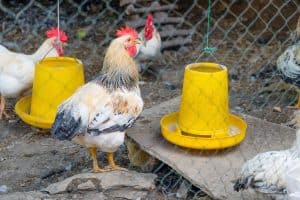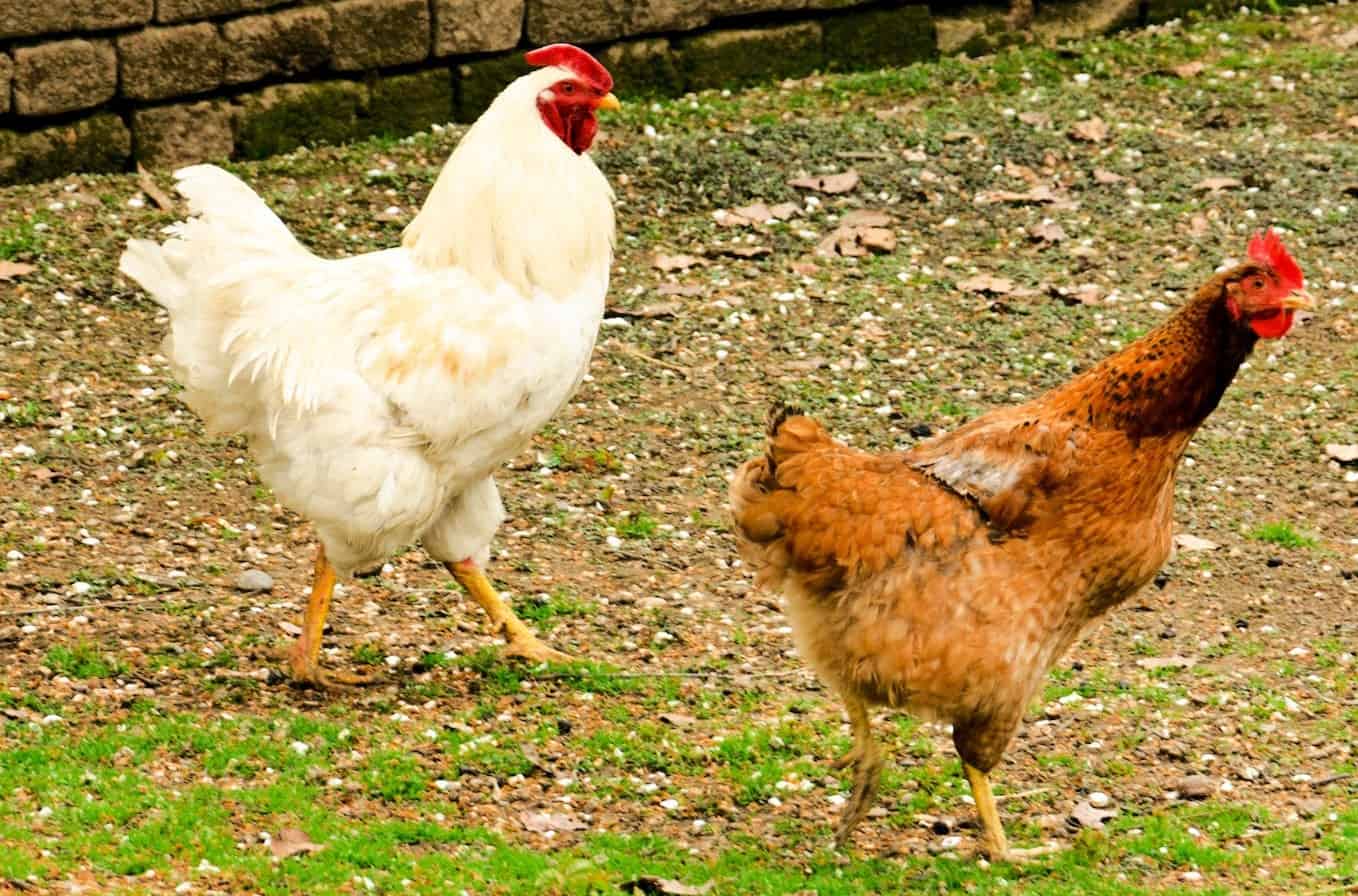To keep your flock healthy and productive, knowing the signs of common illnesses is crucial. Coryza is one such illness of which chicken keepers should be aware. Infectious coryza is a serious bacterial disease that is contagious and can spread among chickens. It affects the upper respiratory tract.
This sickness can be dangerous for very old chickens, chicks, and chickens who aren’t as healthy overall. It isn’t the end of the world for most in your flock, but by acting quickly and with proper care, you can help your chickens get better fast. It will be important to avoid its spread throughout your flock.
Every homesteader has the dream of having healthy, happy animals. However, the realities of life mean that sometimes, the critters are going to get sick. If you are feeding your chickens, and you notice that one of the gals is looking a little droopy, you need to act quickly.
Illness may be contagious, and the quicker you treat a sick bird, the quicker she will be back in production and enjoying life once again. When you learn about common chicken diseases like infectious coryza, you can act quickly to treat affected birds.
What Is Coryza?
Sometimes called “catarrh” or “pip,” in the chicken world, infectious coryza is a common respiratory disease. In the human world, its equivalent would be the common cold. While that doesn’t sound too awful, it can be a pretty rough disease for older chickens or those who are having immunity issues, like young hens or those who are going through a stressful time, like when molting.
This disease is caused by the bacteria Haemophilus paragallinarum, and it is an illness that causes inflammation and irritation of the upper respiratory tract in chickens. A similar illness is found in other kinds of poultry like turkeys, quail, and guineas, but it is thought that the other illnesses are caused by a slightly different bacteria.
Coryza Symptoms
You may see a change in temperament from your otherwise healthy birds. If you are watching for coryza in chickens, you should be alert for the following signs and symptoms:
- Swelling of the face, including the wattles
- Pale combs, sometimes swollen
- Thick, smelly discharge from nostrils and eyes
- Bubbles at the corner of the eye
- Labored breathing
- Reduction in eating and drinking
- Weakness and lethargy
- Eyes may become crusty
How Do Chickens Catch Coryza?
Chickens get infectious coryza mainly from contact with other chickens that have the illness. They can also breathe in the bacteria if they are exposed to it in the air. Sometimes, coryza is transmitted through contaminated food and water.
Also, if a hen has ever had coryza, it may relapse from time to time, and during the relapse it will be able to transmit the disease to other chickens who have never had the illness.
If someone who has coryza in their flock visits your flock, they could bring the bacteria to your flock on their clothing and shoes.
Infectious coryza is still contagious, even before the chicken seems very sick. Most chickens will have a 1 to 3 day incubation period after exposure during which time they may still be able to transmit the illness.
If you think one or more of your chickens has contracted coryza, isolate them from the other birds.

Is Coryza Dangerous?
Coryza is dangerous for very young chickens, very old chickens, or chickens who are stressed, and their immunity is low. The mortality of this illness is around 20 percent, so it’s best to avoid having the disease introduced to your flock if at all possible.
The older your chickens, the higher the likelihood that you will lose greater numbers of chickens when they are infected.
Coryza in chickens can be dangerous also in the sense that it is highly contagious and can affect your entire flock. However, it is considered to be a common chicken disease.
How Do I Treat Coryza?
Coryza can be treated with antibiotics. However, it is really important to get the correct antibiotics for this illness. Some antibiotics will not be effective against this condition.
Consult a poultry knowledgeable veterinarian when you first see the signs of the illness, and your vet will test your chickens for the disease. Then, the vet can prescribe an antibiotic that will work to heal your chickens.
Usually, the medicines will be streptomycin, erythromycin, or sulfonamides. Often, the antibiotics are put the chickens’ water, so they are easier to administer.
Do not try to treat the disease with antibiotics on your own. The overuse of antibiotics can lead to antibiotic resistance over time. Consult your veterinarian, and you can get professional advice for treating your flock.

How Can I Prevent Coryza?
Healthy, happy, young to middle-aged birds are at low risk for dying of coryza in chickens, if you are careful. There are a few things that that can decrease the likelihood that your chickens might come down with this illness.
Clean coop
First, keep your coop clean, dry, and have adequate space for each of your birds. This will go a long way to keeping your chickens healthy. This illness spreads when animals are under stress, and dirty, overcrowded pens stress chickens.
Additionally, when the pens are too full, one or two birds being sick means that the disease will spread like wildfire.
Coryza bacteria will stick around in damp, dirty environs, so keep your coop clean. A weekly scooping of manure will go a long way toward keeping coryza at bay.
The bacteria doesn’t like disinfectants or heat either, so cleanliness makes a big difference. Clean feeders and chicken waterers.
It is important to thoroughly clean the coop and surrounding areas if your chickens catch coryza. If only one or a few of your birds get it, you don’t want it spreading to the healthy hens, roosters and chicks.
Clean your boots
Second, avoid places where you can pick up birds that may already have coryza. When you go to a swap meet or county fairs you have no idea about the flock health of those chickens that are there. If you go just to look around, wash your clothing and disinfect your boots before you tend your own flock at home.
Quarantine new chickens
Third, if you buy new chickens, quarantine them away from your flock for at least thirty days before combining them with your existing chickens. Even if the hens are from a reputable seller, it is always a good idea to give the new hens a month in a separate pen so that any minor illnesses will be past before you expose your existing flock to the new birds.
Isolate chickens with coryza
Fourth, if you notice a bird that starts looking ill, immediately isolate it from the rest of the flock. This highly infectious disease spreads fast, even when the chickens are not showing very many symptoms. If you wait until the hen is very sick, it may be too late to keep it from spreading to the rest of the flock.
Consider any new birds if you’ve had an outbreak
Last, if one of your chickens has had coryza, it will be there forever. It is usually acute and at times chronic. Periodically, the chicken may have a relapse during which time it can infect other new birds. You should consider vaccinating any new birds if you have had coryza in your flock.
Humans Can’t Catch It
There is good news about this common chicken disease. The illness of coryza is solely a poultry disease. Humans can not catch coryza from chickens. Additionally, eggs cannot transmit coryza either. Regardless, practice good hygiene and always be sure to wash your hands after handling your flock.
Learn about water belly in chickens as well.

